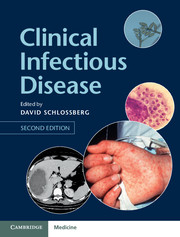Book contents
- Frontmatter
- Dedication
- Contents
- List of Contributors
- Preface
- Part I Clinical syndromes: general
- Part II Clinical syndromes: head and neck
- Part III Clinical syndromes: eye
- Part IV Clinical syndromes: skin and lymph nodes
- Part V Clinical syndromes: respiratory tract
- 29 Acute bronchitis and acute exacerbations of chronic airways disease
- 30 Croup, supraglottitis, and laryngitis
- 31 Atypical pneumonia
- 32 Community-acquired pneumonia
- 33 Nosocomial pneumonia
- 34 Aspiration pneumonia
- 35 Lung abscess
- 36 Empyema and bronchopleural fistula
- Part VI Clinical syndromes: heart and blood vessels
- Part VII Clinical syndromes: gastrointestinal tract, liver, and abdomen
- Part VIII Clinical syndromes: genitourinary tract
- Part IX Clinical syndromes: musculoskeletal system
- Part X Clinical syndromes: neurologic system
- Part XI The susceptible host
- Part XII HIV
- Part XIII Nosocomial infection
- Part XIV Infections related to surgery and trauma
- Part XV Prevention of infection
- Part XVI Travel and recreation
- Part XVII Bioterrorism
- Part XVIII Specific organisms: bacteria
- Part XIX Specific organisms: spirochetes
- Part XX Specific organisms: Mycoplasma and Chlamydia
- Part XXI Specific organisms: Rickettsia, Ehrlichia, and Anaplasma
- Part XXII Specific organisms: fungi
- Part XXIII Specific organisms: viruses
- Part XXIV Specific organisms: parasites
- Part XXV Antimicrobial therapy: general considerations
- Index
- References
34 - Aspiration pneumonia
from Part V - Clinical syndromes: respiratory tract
Published online by Cambridge University Press: 05 April 2015
- Frontmatter
- Dedication
- Contents
- List of Contributors
- Preface
- Part I Clinical syndromes: general
- Part II Clinical syndromes: head and neck
- Part III Clinical syndromes: eye
- Part IV Clinical syndromes: skin and lymph nodes
- Part V Clinical syndromes: respiratory tract
- 29 Acute bronchitis and acute exacerbations of chronic airways disease
- 30 Croup, supraglottitis, and laryngitis
- 31 Atypical pneumonia
- 32 Community-acquired pneumonia
- 33 Nosocomial pneumonia
- 34 Aspiration pneumonia
- 35 Lung abscess
- 36 Empyema and bronchopleural fistula
- Part VI Clinical syndromes: heart and blood vessels
- Part VII Clinical syndromes: gastrointestinal tract, liver, and abdomen
- Part VIII Clinical syndromes: genitourinary tract
- Part IX Clinical syndromes: musculoskeletal system
- Part X Clinical syndromes: neurologic system
- Part XI The susceptible host
- Part XII HIV
- Part XIII Nosocomial infection
- Part XIV Infections related to surgery and trauma
- Part XV Prevention of infection
- Part XVI Travel and recreation
- Part XVII Bioterrorism
- Part XVIII Specific organisms: bacteria
- Part XIX Specific organisms: spirochetes
- Part XX Specific organisms: Mycoplasma and Chlamydia
- Part XXI Specific organisms: Rickettsia, Ehrlichia, and Anaplasma
- Part XXII Specific organisms: fungi
- Part XXIII Specific organisms: viruses
- Part XXIV Specific organisms: parasites
- Part XXV Antimicrobial therapy: general considerations
- Index
- References
Summary
Introduction
Aspiration is the introduction of oropharyngeal or gastric contents into the respiratory tract. Three major syndromes may develop as a consequence of aspiration: chemical pneumonitis, bronchial obstruction secondary to aspiration of particulate matter, and bacterial aspiration pneumonia. Less commonly, interstitial lung disease occurs in persons with chronic aspiration. Which of these consequences emerges is determined by the amount and nature of the aspirated material as well as by the integrity of host defense mechanisms.
The term aspiration pneumonia refers to the infectious consequences of introduction of relatively large volumes of oral material into the lower airways (macroaspiration). Although healthy persons frequently aspirate small volumes of pharyngeal secretions during sleep, the development of pneumonia after such microaspiration is normally prevented by mechanical (e.g., cough and mucociliary transport) and immunologic responses. Pneumonia arises when these host defenses are not able to limit bacterial proliferation either because of microaspiration of highly virulent pathogens to which the host lacks specific immunity (e.g., Streptococcus pneumoniae or enteric gram-negative bacteria) or because of macroaspiration of large quantities of organisms that may not necessarily be highly virulent.
Aspiration may be clinically obvious, as when acute pulmonary complications follow inhalation of vomited gastric contents. Such acute chemical pneumonitis, representing damage to lung parenchyma by highly acidic gastric contents, is often referred to as Mendelson’s syndrome. On the other extreme, so-called silent aspiration, as occurs in persons with neurologic impairment who lack cough responses, is often followed by the indolent onset of infectious pneumonia consequent to contamination of the lower airways by low virulence mixtures of aerobic and anaerobic microorganisms from the oropharynx.
- Type
- Chapter
- Information
- Clinical Infectious Disease , pp. 226 - 232Publisher: Cambridge University PressPrint publication year: 2015



